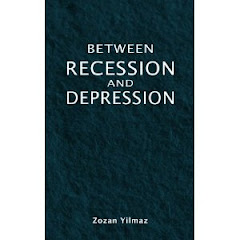The Economist's new survey thinks the answer is "no"
I think the closer an economy with protectionist measures such as tariffs, quotas the more likely it is the case
Wednesday, 29 June 2011
Friday, 24 June 2011
"50 big ideas": Capitalism
Capitalism is the 38th of ideas.
Evolving around three main thoughts of Classical Economists (mainly Adam Smith, David Ricardo, John Stuart Mill); Keynesians and monetarists during the last few centuries.
Evolving around three main thoughts of Classical Economists (mainly Adam Smith, David Ricardo, John Stuart Mill); Keynesians and monetarists during the last few centuries.
Thursday, 23 June 2011
"50 big ideas": Existentalism
Existentalism is the 13th of ideas in the book. I am reading the top paragraph, which makes me think whether this is be the case or the opposite. It says:
If anyone had asked me what existence was, I would have answered, in good faith, that it was nothing, simply an empty form which was added to external things without changing anything in their nature.
If anyone had asked me what existence was, I would have answered, in good faith, that it was nothing, simply an empty form which was added to external things without changing anything in their nature.
Saturday, 18 June 2011
Jane Austen
The best author I have read sofar is Jane Austen. Some of her books are so fluid that few hundred pages could be read in one day and the whole book finished in few days.
Friday, 17 June 2011
Global Growth - New Debate of The Economist
"Will global growth pick up in the second half of 2011?" is the new debate of The Economist.
This blogger doesn't see any such sign now and doesn't expect until 2012.
This blogger doesn't see any such sign now and doesn't expect until 2012.
Wednesday, 15 June 2011
Bubble mania
The nature of the second decade of the 21st century seems to be able to create bubble mania. What I mean by this term is bubbles of all sorts from tech (which The Economist thinks there is a new one) to property; equity, bond, hedge funds, commodities.
I am wondering if normal distribution is applicable? Perhaps something adapted to it can be called bubble distribution with the mean and the variance not being zero and one.
I am wondering if normal distribution is applicable? Perhaps something adapted to it can be called bubble distribution with the mean and the variance not being zero and one.
To Write
Writing is an art, which gets its nutrition from itself only. The more you write the better it gets vice versa.
It is "fill in the blanks" time.
It is "fill in the blanks" time.
Sunday, 12 June 2011
IS – LM MODEL
How would IS – LM model work in the current economy? On LM side, there is a huge injection into the economy through quantitaitve easing but interest rates are kept at record low levels with central bank decision. Theoretically injection should bring the interest rates down but it is staying at its current levels. Where in the economy is this absorbed is a question coming to the mind of this blogger.
As far as follwed, IS schedule is only affected by a contraction in aggregate demand and supply components.
How those two schedules will interact to determine the equilibrium income and interest rate is something this blogger will be watching in the second half of the year.
As far as follwed, IS schedule is only affected by a contraction in aggregate demand and supply components.
How those two schedules will interact to determine the equilibrium income and interest rate is something this blogger will be watching in the second half of the year.
Wednesday, 8 June 2011
BRICs
While reading 'The World in 2011', it was noticed that BRIC's I and R approximately have the same GDP but I has 10fold more population than R.
I & C leading with their over one billion population whereas B & R are 195million , 141 million respectively.
How would it look like to have them as 1) BR & IC or 2) RI & BC and add other emerging nations to each in accordance to population in 1) GDP in 2)?
OR just focus on growth rates?
I & C leading with their over one billion population whereas B & R are 195million , 141 million respectively.
How would it look like to have them as 1) BR & IC or 2) RI & BC and add other emerging nations to each in accordance to population in 1) GDP in 2)?
OR just focus on growth rates?
Sunday, 5 June 2011
Banking
Brilliant publication, The Economist's current debate on banking is quite interesting on whether more competition makes banking more dangerous or not.
I believe the core of the problem is the expertise. Expertise in understanding the financial products, which is a scarce resource. And expertise is linked to competition.
1) Competition with more / new banks; then banking is more dangerous (lack of scarce resource)
2) With existing banks getting more competitive; then again more dangerous considering the nature of the industry.
I believe the core of the problem is the expertise. Expertise in understanding the financial products, which is a scarce resource. And expertise is linked to competition.
1) Competition with more / new banks; then banking is more dangerous (lack of scarce resource)
2) With existing banks getting more competitive; then again more dangerous considering the nature of the industry.
Subscribe to:
Comments (Atom)


